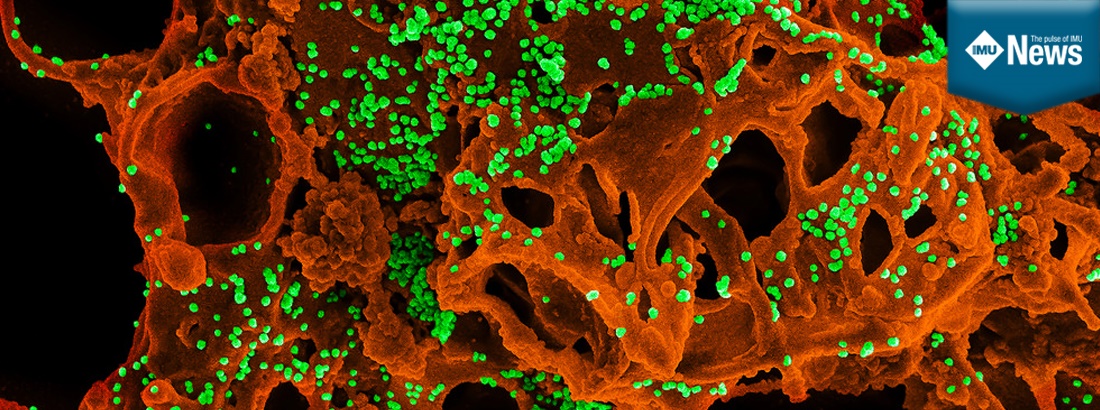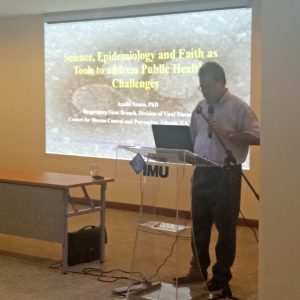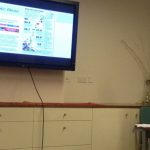The Institute for Research, Development, and Innovation (IRDI) from the International Medical University (IMU) kick-started 2019 by organising the first Translational Research Seminar titled “Science, Epidemiology and Faith as Tools to Address Public Health Challenges” featuring Dr Azaibi Tamin on 4 January 2019 at IMU’s Bukit Jalil campus.
The talk focused on the Middle East Respiratory Syndrome (MERS) which is a viral respiratory disease caused by Middle East Respiratory Syndrome Coronavirus (MERS‐CoV). MERS-CoV, first identified in Saudi Arabia in 2012, originates from a large family of coronavirus that can cause diseases ranging from common cold to Severe Acute Respiratory Syndrome (SARS). The symptoms of MERS-CoV range from no symptom (asymptomatic) or mild respiratory symptoms to severe acute respiratory disease and death. At times, pneumonia and diarrhoea can be present, too.
The main objective of this seminar was to enlighten the audience on the dynamic relationship between science and epidemiology to study the transmission, outbreak investigation, infection control, immune response, and vaccine for MERS-CoV. Dr Azaibi first narrated on immunosignature which is an application of science to tackle MERS-CoV. It is a medical diagnostic test that helps track a person’s health and diagnose infections, cancers, or other medical conditions based on the information provided by the changing antibodies in a person’s blood. Secondly, Dr Azaibi continued to talk on the application of epidemiology which is the study of how often diseases occur in different groups of people and why. The information gathered is essential to plan and evaluate strategies to tackle and prevent illness. For MERS-CoV, epidemiology helps to identify the risk factors for camel to human transmission, human to human transmission, the percentage of asymptomatic cases and their roles in human to human transmission. Interestingly, Dr Azaibi also brought up faith as a higher level of knowledge than science and epidemiology to tackle disease like MERS-CoV. Since faith is an influential factor in human behaviour, attitude, and worldview, Dr Azaibi also discussed how faith may add another dimension if not opportunity to address public health challenges.
| About the Keynote Speaker |
|---|
| The keynote speaker for this talk was Dr Azaibi Tamin who is a senior research microbiologist from the Centers for Disease Control and Prevention (CDC), Atlanta, United States of America (USA). Dr Azaibi received his Bachelor of Science in Microbiology from University of Leeds, United Kingdom (UK) in 1983 and Doctor of Philosophy in Microbiology at Oregon State University, USA. His research interest is virology, pathogenesis, diagnostic method, and relationship between science, medicine, and humanities. Dr Azaibi came to CDC as a US Academy of Science National Research Council Postdoctoral Fellow in 1989. He was a key player in CDC’s team to prove the still efficacious live measles vaccine after a deadly US outbreak of measles in 1990/91, identified and sequenced Nipah virus from Malaysia’s Japanese encephalitis (JE) outbreak in 1998/99, identified and sequenced SARS-CoV, and is the principal investigator for CDC’s MERS-CoV Biosafety Level 3 (BSL-3) activities. He has isolated more than a dozen of MERS-CoV isolates from Saudi Arabia, Jordan, UAE, and US MERS cases. |










